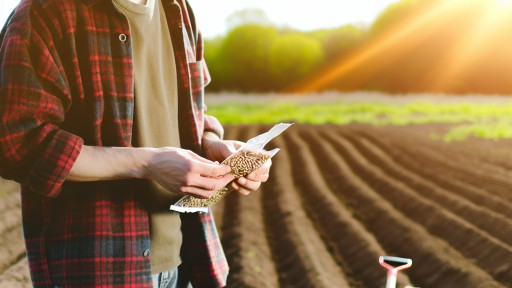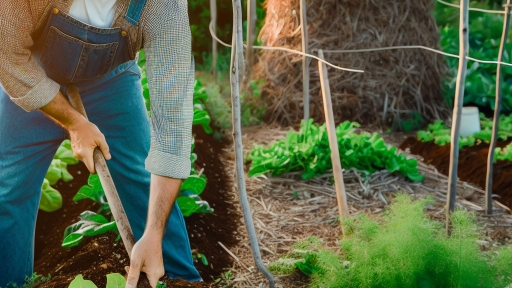Understanding the Concept of Agri-Tourism and Its Benefits for Farmers
Defining Agri-Tourism
Agri-tourism combines agriculture and tourism for mutual benefit.
It involves visitors engaging in farming activities.
This can include picking fruits, touring farms, or staying on-site.
Benefits for Farmers
Agri-tourism increases revenue streams for farmers.
Farmers can benefit from direct sales of products.
Moreover, it helps diversify farm activities and experiences.
Enhancing Community Engagement
Agri-tourism fosters relationships between farms and local communities.
It encourages community members to support local agriculture.
Events can build a strong local following for the farm.
Promoting Agricultural Education
These events educate visitors about farming practices.
They highlight the importance of sustainable agriculture.
Additionally, visitors learn about food production processes.
Increasing Visibility and Marketing Opportunities
Agri-tourism allows farmers to market their produce directly.
It enhances the visibility of local brands.
Farm visits can create memorable experiences that encourage repeat visits.
Transform Your Agribusiness
Unlock your farm's potential with expert advice tailored to your needs. Get actionable steps that drive real results.
Get StartedLeveraging Social Media
Social media amplifies the reach of agri-tourism events.
Farmers can share unique experiences and farm stories online.
This attracts a wider audience and increases event participation.
Networking and Partnerships
Agri-tourism opens doors to partnerships with local businesses.
Farmers can collaborate with restaurants, hotels, or markets.
These partnerships can result in bundled offerings and promotions.
Mitigating Economic Risks
Agri-tourism acts as a buffer against fluctuating market prices.
It provides an alternative source of income during off-seasons.
Furthermore, it can enhance financial stability for farms.
Adapting to Market Trends
Engaging in agri-tourism allows farmers to adapt to consumer trends.
They can offer experiences that cater to changing visitor preferences.
This increases resilience in an ever-evolving market.
Identifying Potential Attractions and Activities on Your Farm
Understanding Your Farm’s Unique Features
Your farm possesses unique characteristics that can attract visitors.
Evaluate your landscape, animals, and crops carefully.
Consider what makes your farm special compared to others.
This analysis will form the foundation for your agri-tourism offerings.
Engaging Activities for Visitors
Plan activities that engage visitors and provide memorable experiences.
Consider farm tours to showcase daily operations.
- Make farm-to-table experiences a priority.
- Include hands-on workshops featuring farm skills.
- Offer seasonal harvest festivals to attract crowds.
Popular activities may include fruit picking and hayrides.
Utilizing Farm Products and Resources
Your farm products can enhance the visitor experience.
Consider adding a farm shop to sell fresh produce and goods.
Hosting tastings or cook-offs can also be engaging.
Work with local chefs to create unique dining events.
Working with Local Communities
Collaborate with local businesses and organizations.
Showcase Your Farming Business
Publish your professional farming services profile on our blog for a one-time fee of $200 and reach a dedicated audience of farmers and agribusiness owners.
Publish Your ProfilePartnering with nearby farms can elevate your offerings.
- Consider co-hosted events with local artisans.
- Engage with schools for educational field trips.
- Network with tourism boards for marketing support.
This teamwork strengthens community ties and attracts more visitors.
Promoting Your Events
Effective promotion is essential for successful agri-tourism events.
Utilize social media to engage potential visitors.
- Create visually appealing content to share on platforms.
- Leverage local newspapers and magazines for advertising.
- Consider email newsletters to keep subscribers informed.
Additionally, engaging photography can draw more interest.
Establishing Your Target Audience for Agri-Tourism Events
Identifying Your Ideal Visitors
Understanding your ideal visitors is crucial for effective planning.
Start by analyzing the local demographics of your area.
Consider age groups, family compositions, and interests.
For instance, young families may seek interactive experiences.
Older adults might prefer farm tours and tastings.
Researching Visitor Interests
Gather insights about what potential visitors enjoy.
Conduct surveys to learn about their preferences.
You can also review social media interactions for clues.
Look for trends in what agri-tourism events attract attention.
This research will guide your event planning decisions.
Competing Events Analysis
Analyze events hosted by local farms and attractions.
Identify what they offer that appeals to visitors.
Take note of their marketing strategies and audiences.
This will help you differentiate your offering.
A unique feature can make your event stand out.
Creating Visitor Personas
Develop visitor personas to represent your audience segments.
These personas should include demographic and psychographic data.
Think about lifestyles, motivations, and potential barriers.
For example, a persona may be a young couple interested in sustainable farming.
Using these personas will refine your marketing efforts.
Seasonal Considerations
Consider the time of year when planning your events.
Different seasons attract different types of visitors.
For instance, autumn may draw families for pumpkin picking.
Spring might appeal to those interested in new growth experiences.
Align your events with seasonal interests to maximize attendance.
Collaborating with Local Businesses
Partnerships with local businesses can enhance your events.
Consider collaborating with nearby restaurants or wineries.
They can provide food or beverage options at your events.
This not only benefits your visitors but also your community.
Joint promotions can expand your audience reach.
Gain More Insights: Sustainable Harvesting Methods For Farmers
Creating a Detailed Plan for Agri-Tourism Events
Importance of a Structured Approach
A well-structured plan enhances the success of your agri-tourism events.
It helps you stay organized and focused on your goals.
Moreover, it allows you to allocate resources effectively.
Determining Event Timing
Start by identifying the best time for your events.
Showcase Your Farming Business
Publish your professional farming services profile on our blog for a one-time fee of $200 and reach a dedicated audience of farmers and agribusiness owners.
Publish Your ProfileConsider seasonal crops and peak tourist seasons.
Align your events with local holidays and festivals.
For example, fall harvest festivals attract more visitors.
Ensure that you avoid scheduling conflicts with local events.
Selecting Event Frequency
Next, decide how often to hold your events.
Weekly events are great for maintaining engagement.
Monthly events can create anticipation and excitement.
Furthermore, seasonal events can leverage unique offerings.
Creating a Detailed Event Calendar
Once you determine timing and frequency, create an event calendar.
This calendar should include dates, times, and event details.
Share the calendar on your website and social media platforms.
Regular updates keep your audience informed and engaged.
Setting Clear Objectives
Establish clear objectives for each event you plan.
Objectives should be specific, measurable, and attainable.
For instance, aim to attract a specific number of visitors.
Additionally, set goals for your product sales during events.
Evaluating and Adjusting Plans
Finally, evaluate the success of each event after completion.
Gather feedback from attendees for insights on improvements.
Adjust future plans based on this feedback to enhance experiences.
This iterative process ensures ongoing improvement and success.
You Might Also Like: Agri-Tourism and Direct Sales: A Winning Combo
Developing Partnerships with Local Businesses and Organizations
Building strong partnerships is essential for successful agri-tourism events.
Consider collaborating with local businesses to enhance your event offerings.
For instance, nearby wineries can provide tastings during your farm events.
Meanwhile, bakeries might supply fresh bread for workshops or picnics.
This collaboration brings mutual benefits and enriches attendees’ experiences.
Moreover, local restaurants can feature dishes made from your farm’s produce.
Such partnerships increase exposure for both your farm and the participating businesses.
Identifying Potential Partners
The first step is to identify businesses that align with your values and goals.
Reach out to local farmers’ markets and see how you can work together.
Additionally, check local tourism boards for connections to relevant organizations.
Networking events are excellent places to meet potential partners.
Don’t hesitate to approach people and start conversations.
Shared interests pave the way for mutually beneficial partnerships.
Co-Promotional Opportunities
Effective promotions can amplify the reach of your events.
Consider hosting joint marketing campaigns with your partners.
Shared social media posts can increase visibility for all involved.
Creating flyers that feature both your farm and your partner’s brand is another option.
Additionally, you can offer bundled packages for events.
For example, partner with a local hotel to offer discounted stays during your events.
Showcase Your Farming Business
Publish your professional farming services profile on our blog for a one-time fee of $200 and reach a dedicated audience of farmers and agribusiness owners.
Publish Your ProfileEngaging the Community
Engaging local community members can foster lasting relationships.
Invite local organizations to participate in your events as sponsors.
Such involvement often leads to more extensive engagement from the community.
Consider reaching out to schools for educational programs on your farm.
Hands-on experiences can promote understanding and appreciation of agriculture.
Engaging local nonprofits can also bring additional resources to your events.
Measuring Success
Finally, establish criteria to measure the success of your partnerships.
Track attendance and engagement levels at your agri-tourism events.
Solicit feedback from attendees regarding their experiences.
Additionally, monitor sales for both your farm and your partners.
Analyzing this data can help strengthen future collaborations.
Continually adjusting your approach ensures ongoing success over time.
Delve into the Subject: Eco-Friendly Fertilizers For Sustainable Agriculture
Marketing Strategies to Promote Your Agri-Tourism Events
Identifying Your Target Audience
Start by identifying who will enjoy your agri-tourism events.
Consider factors like age, interests, and location of potential visitors.
Knowing your audience helps tailor marketing efforts effectively.
Creating Engaging Online Content
Use social media to share captivating images of your farm.
Engage followers with stories about your farm’s activities.
Write blog posts that highlight upcoming events and farm news.
Encouraging user-generated content fosters community interest.
Utilizing Email Marketing
Build an email list of interested visitors and local residents.
Send out newsletters that include event schedules and specials.
Include compelling reasons to attend and links to your site.
Collaborating with Local Businesses
Partner with local hotels and restaurants for cross-promotion.
Offering discounts or packages can attract more visitors.
Joint social media campaigns can broaden reach and engagement.
Hosting Free or Low-Cost Events
Organize open-house days to attract first-time visitors.
Consider hosting workshops that highlight unique farming practices.
These events enhance community involvement and attract media coverage.
Leveraging Influencer Marketing
Identify local influencers who share interests in agriculture and tourism.
Invite them to experience your farm and promote their visit.
Their reach can introduce your farm to a wider audience.
Using Traditional Advertising Methods
Consider local newspapers or magazines to reach your community.
Bulletin boards at community centers can also share your events.
Utilizing flyers or posters in strategic places increases visibility.
See Related Content: Sustainable Farming Through Agri-Tourism Practices

Ensuring Compliance with Legal and Safety Regulations
Understanding Local Regulations
Each farm must adhere to specific local regulations.
These regulations can vary significantly by location.
First, research your state and county requirements thoroughly.
Consult with local agricultural offices for guidance.
Showcase Your Farming Business
Publish your professional farming services profile on our blog for a one-time fee of $200 and reach a dedicated audience of farmers and agribusiness owners.
Publish Your ProfileAdditionally, familiarize yourself with zoning laws related to agri-tourism.
Permits and Licenses
Securing necessary permits is crucial for hosting events.
Some common permits include health department permits.
Also, review fire safety regulations related to events.
Check if you need liability insurance for visitors.
Consider seeking legal advice to ensure compliance.
Safety Protocols
Establishing safety protocols safeguards your guests.
Start by conducting a thorough risk assessment of your property.
Identify potential hazards, such as machinery, livestock, or uneven terrain.
Next, develop an emergency response plan for unexpected incidents.
Train your staff on safety procedures and first-aid responses.
Signage and Communication
Clear signage enhances safety and compliance on your farm.
Post signs that highlight potential hazards and safety rules.
Ensure all signage is easily visible and understandable.
Additionally, provide guests with orientation about safety protocols.
Use multiple communication methods to relay important information.
Monitoring and Evaluation
Regularly evaluate your compliance with legal regulations.
Implement feedback mechanisms for event participants.
Post-event, review any incidents to improve future planning.
Maintain open lines of communication with regulatory agencies.
This proactive approach helps uphold safety and legal standards.
Assessing and Adapting Based on Feedback from Visitors
Gathering Visitor Feedback
Collecting feedback is essential for improving your agri-tourism events.
Use surveys to gather opinions and suggestions from visitors.
Consider implementing feedback boxes on-site for immediate responses.
Email follow-up surveys can also capture detailed insights.
Be sure to ask specific questions about their experiences.
This clarity helps identify areas for potential enhancement.
Analyzing Feedback Data
Once you collect feedback, analyze the data thoroughly.
Look for common themes in visitor responses.
Assess both positive and negative comments for a balanced view.
Utilize charts and graphs to visualize trends for easier understanding.
This analysis will inform your decision-making process.
Implementing Changes
After you analyze the feedback, prioritize changes to implement.
Focus on changes that will create the most significant impact.
Consider quick fixes that can improve visitor experiences immediately.
Longer-term changes may require more planning and resources.
Communicate these changes to your visitors to show you value their input.
Continuously Monitoring Visitor Satisfaction
Regularly revisit your feedback collection methods.
Make adjustments as necessary to meet evolving visitor expectations.
Try different strategies to keep feedback fresh and engaging.
Showcase Your Farming Business
Publish your professional farming services profile on our blog for a one-time fee of $200 and reach a dedicated audience of farmers and agribusiness owners.
Publish Your ProfileMonitor visitor satisfaction consistently over time.
This ongoing process helps maintain high standards for your events.
Budgeting for Your Agri-Tourism Events and Pricing Strategies
Creating a Comprehensive Budget
Begin by assessing all potential expenses associated with your event.
Consider costs such as marketing, staffing, and materials.
Don’t forget to factor in venue setup and maintenance costs.
Include any special permits or licenses required for your operations.
Gather input from your team to ensure no detail is overlooked.
Estimating Revenue Potential
Identify potential income streams your event can generate.
Ticket sales will likely be your primary source of revenue.
Additionally, explore options for merchandise or food sales.
Consider offering exclusive experiences at a premium price.
Always keep your target audience in mind when setting prices.
Developing Effective Pricing Strategies
Conduct market research to understand pricing trends in agri-tourism.
Compare your pricing with similar events in the region.
Consider implementing tiered pricing for different experiences.
Offer early bird discounts to encourage early ticket purchases.
Analyze your findings and adjust based on demand and competition.
Monitoring and Adjusting Your Budget
Review your budget regularly to track actual expenses versus estimates.
Make adjustments as needed to avoid overspending.
Be prepared to pivot and find alternative solutions if challenges arise.
Engage your team in discussions about financial management.
Utilizing Feedback for Future Events
After your event, gather feedback from attendees regarding pricing.
Analyze what worked and what could be improved for next time.
Use this information to refine your budgeting process.
Incorporate lessons learned into future event planning.
By staying flexible, you can better meet customer expectations.
Additional Resources
Local Food Systems: Concepts, Impacts, and Issues, ERR 97, US …




